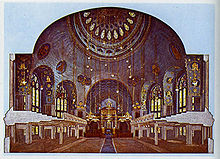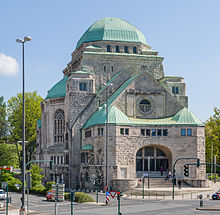Salomon Samuel
Salomon Samuel (born October 6, 1867 in Culm , West Prussia province ; † October 14, 1942 in Theresienstadt concentration camp ) was a German rabbi , philologist and author .
Life
Born in 1867 as the son of a chasan and religion teacher, Salomon Samuel went to Berlin in 1886 after completing high school , where he began linguistic, historical and philosophical studies at the university and devoted himself to theological training at the Institute for the Science of Judaism . In 1893 received his doctorate him the University of Halle-Wittenberg for Dr. phil.
From 1894 to 1932 Samuel was the first rabbi of the Essen synagogue community and taught as a reform-oriented and anti-Zionist religious educator at the Jewish elementary school. Before the First World War, his area of responsibility was dominated by the construction of the new synagogue , of which he was one of the initiators. In the middle of the city center, the house was intended to symbolize the arrival of Judaism in German society.
According to plans by the architect Edmund Körner , the Essen synagogue, including the weekday synagogue, teaching rooms, community hall, secretariat, library, garden and rabbi and cantor apartments in the attached rabbi house, was completed in two years and inaugurated on September 25, 1913. The rabbi had given the architect valuable suggestions for the design of the huge building with regard to the ornamental decoration using the tradition of Judaism, in particular the symbols to be used for the mosaics and glass paintings. On the occasion of the inauguration of the new synagogue, Kaiser Wilhelm II awarded Samuel the Red Eagle Order IV class . Twenty-five years later, this synagogue, recognized as one of the most beautiful in Germany, also fell victim to the flames of the National Socialist November pogroms .
During his 38-year term of office as the first rabbi of the Essen synagogue community, he was characterized by constant tolerance and care for those in need. Just as his wife Anna (1874–1942), born in Friedlaender and a graduate of a painting school, who was married in 1899, became the chairwoman of the Israelite Women's Association and an active member of the Essen branch of the International Peace Society, Salomon Samuel worked tirelessly for social integration: he was the founder and chairman of the literary association, whose foreign speakers were often accommodated in the Samuel house, founder of the Jewish youth association and member of the association for liberal Judaism. Notable are his active memberships u. a. in the Rhenish-Westphalian Rabbis Association, in the Association of Israelite Teachers of Rhineland and Westphalia and in the Commission for Advising on School Matters, in the Association of German Jews and in the Historical Association for the City and Monastery of Essen. Through lectures and courses, he participated in the Essen academic courses and in the municipal adult education center . During his work, the demands of welfare work were always great, the flow of refugees from the east seldom stopped, especially after the Russian pogroms. According to his son Hans Jochanan, he turned out to be “a true father of the poor and oppressed, the reputation of his generous disposition was carried far and wide”.
For example, Isaak Weltz-Bezem, who fled from Poland with his family , was employed as the last gabbe of the Essen synagogue before its destruction; this family was again expelled from Germany to Poland at the end of October 1938 in the “ Poland Action ”; It is largely thanks to the youngest son, Leo Weltz-Bezem, who emigrated to Palestine before the German invasion of Poland and the Israeli painter and sculptor Naftali Bezem, who subsequently became internationally known , that the destroyed sacred building could be restored on the basis of original documents and now can serve as a memorial “ Old Synagogue Essen ”.
Salomon Samuel ran an open house with his wife Anna; they had four children, all four later emigrated to Palestine / Israel: Ludwig Elieser (1900–1966) - he became a political scientist and diplomat; Eva Chavah (1904–1989) - she became a widely recognized ceramicist; Edith: (1907–1964) - she became known as a sculptor, draftsman and doll maker; and Hans Jochanan (1901–1976) - he worked as an organist and composer. Anna's brother, the philosopher and writer Salomo Friedlaender / Mynona , raved about this "loving, spirit-filled, humanly cultivated couple in the most beautiful sense" in an autobiographical sketch , and noted that he spent a few weeks in Essen every year and, through his brother-in-law, the Essen lawyer and got to know the philosopher Ernst Marcus , whom he soon apostrophized as an “incomparable thinker”, as a “resurrected Kant” and as a “croup of logic”. With Salomon Samuel's brother Ernst (1878–1943), who called himself Anselm Ruest as an author and publicist , Salomo Friedlaender / Mynona was co-editor of the Max Stirner- oriented magazine “ Der Einzige ” from 1919 to 1925 .
After leaving his community in Essen in December 1932, Salomon Samuel lived in retirement in Berlin, where he still devoted himself to rabbinical care in Berlin old people's homes and also carried out extensive studies in the State Library. In addition to a universal general education, he was thoroughly familiar with medieval and new Hebrew Jewish literature, and read the original Jewish scripts in Arabic, English, Spanish and Italian. He still exercised rabbinical functions, especially in old people's homes, and in recent years he has prepared works on religious studies and worship services, works on new Hebrew literature and Jewish-Spanish poetry. And in an extensive manuscript that he left with the working title 5600 - 5700, Looking Back at a Century of Jewish World Era , he analyzes the trends that developed during this period of emancipation, such as orthodoxy and liberalism.
Together with the inmates of the Jewish old people's home in Berlin-Köpenick, with his wife and sister Cäcilie, Salomon Samuel was deported to the Theresienstadt ghetto on August 24, 1942, where he, his wife and sister perished in October 1942.
Publications (selection)
- 1893: The poem Teḳḳaf l'Arēstotalîs. As a contribution to the Syrian original lexicography and grammar 'for the first time from manuscripts of the Berlin Kgl. Library edited, translated and commented. 1st part (dissertation hall)
- 1905: History of the Jews in the city and monastery of Essen up to the secularization of the monastery, from 1291 to 1802 ; Essen contributions, issue 26.
- 1913: On the further education of Judaism: an appreciation of the "guidelines for a program for liberal Judaism" and criticism of the attacks directed against them .
- 1913: History of the Jews in the city and synagogue district of Essen from the incorporation of Essen into Prussia (1802) to the construction of the synagogue at Steeler Tor (1913). Festschrift for the consecration of the synagogue ; edited on behalf of the municipal council.
- 1915: Bible and Heroism. Five war lectures ; held in the academic courses in Essen in the winter semester of 1914/15.
- 1930: Festschrift for the 25th anniversary of the Israelite old people's home in Unna 1905-1930 .
- 1930: SINAI . - A textbook of the Jewish religion.
- 1936: The Messianic Expectation ; Series of articles in the supplement of the Jüdisch-Liberale Zeitung: Jüdische Theologie (August 1936).
- 1936: A set of documents on the medieval history of the Jews ; in: Der Morgen: Monthly Journal of the Jews in Germany (Issue 9/1936), pp. 430–432.
- 1937: The poet Solomon ben Meschullam Dapiera and the question of his change of faith ; in: Monthly for the history and science of Judaism (1937 / issue 6, p. 481–496).
literature
- Hans Jochanan Samuel: Rabbi Dr. Salomon Samuel , in: Hermann Schröter (Hrsg.): History and fate of the Essen Jews: memorial book for the Jewish fellow citizens of the city of Essen . Essen: City of Essen, 1980, pp. 114–120
- Solomon Friedlaender Mynona. Letters from exile 1933-1946 , ed. by Hartmut Geerken (1982).
- Erwin Dickhoff, Essen heads. Who was what (1985).
- Angela Genger (Ed.), Thousands of years pass through our hearts. Letters from Anna and Solomon Samuel; 1933-1942 (1988).
- Michael Brocke , Julius Carlebach (eds.), Biographisches Handbuch der Rabbis , Volume 2 (2004), p. 535 ff.
- Edna Brocke , Dr. Salomon Samuel - Rabbi in Essen. Questioned from today's perspective using the example of the text “Bible and Heroism. Five War Lectures ” ; in: Jewish life in Essen 1800-1933 , study series of the ALTEN SYNAGOGE , Volume 1 (1993).
- Salomo Friedlaender / Mynona, I (1871-1936). Autobiographical sketch ; from the estate ed. by Hartmut Geerken (2003).
- Gerd Hergen Lübben , On a thin line · For learning and growing from the spirit of truth, art and humanity ; in: DIE BRÜCKE - Forum for Anti-Racist Politics and Culture , Issues 147 ff (2008).
- Martina Strehlen, Dr. Salomon Samuel (1867-1942) , Kalonymos, 16th volume, 2013, issue 4, pp. 1–3 ( online edition, PDF ).
Individual evidence
- ↑ See Horst Katzor (Lord Mayor of Essen), Foreword ; in: The synagogue in Essen. = Facsimile print of Edmund Körner's book Die Neue Synagoge Essen Ruhr , published in Berlin in 1914 . With text by Richard Klapheck. (13th special edition of the architecture of the 20th century as a limited licensed edition of the Society for Christian-Jewish Cooperation eV, Essen (1980); enclosed the 10-color screen print The Last Shabbat (1980) by Naftali Bezem, a son of the last sexton of Essen Synagogue, as a supplement donated exclusively by the artist.)
- ^ Salomo Friedlaender (Mynona): I (1871-1936): Autobiographical sketch (from the estate) . With introductory essays by Hartmut Geerken and Detlef Thiel. Ed .: Hartmut Geerken. Aisthesis Verlag , Bielefeld 2003, ISBN 3-89528-394-0 , p. 52 ff .
- ↑ Solomon Samuel. In: Victims database portal holocaust.cz. Retrieved October 1, 2017 .
- ↑ See Hans Jochanan Samuel, Rabbi Dr. Salomon Samuel ; in: Das Münster am Hellweg, year 1978, issue 8/9, p. 81 ff.
- ↑ History and Fate of the Essen Jews. Memorial book , ed. von der Stadt Essen (1980), p. 114 ff.
- ↑ Erwin Dickhoff, Essen heads. Who was what (1985); ISBN 3-87034-037-1 ; P. 289
- ↑ Biographical Handbook of Rabbis , Volume 2, ed. by Michael Brocke and Julius Carlebach (2004), p. 535 ff.
Web links
- Literature by and about Salomon Samuel in the catalog of the German National Library
- Salomon Samuel: Works in the Digital Collections of the University Library, Goethe University, Frankfurt am Main.
| personal data | |
|---|---|
| SURNAME | Samuel, Solomon |
| ALTERNATIVE NAMES | Samuel, Sally; Theologus (pseudonym) |
| BRIEF DESCRIPTION | German rabbi, philologist and author |
| DATE OF BIRTH | October 6, 1867 |
| PLACE OF BIRTH | Culm |
| DATE OF DEATH | October 14, 1942 |
| Place of death | Theresienstadt concentration camp |


